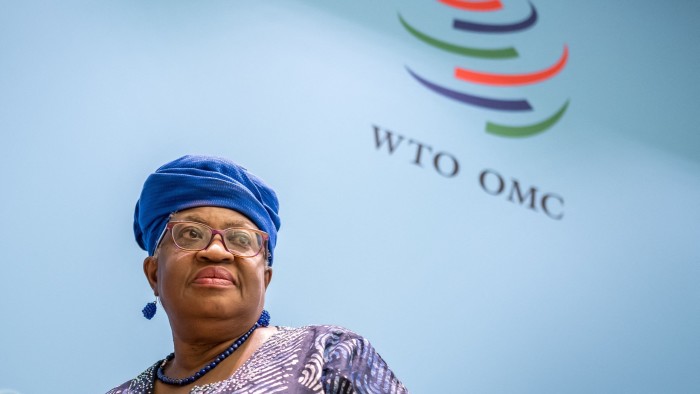The World Trade Organization is one of those multilateral institutions that US President Donald Trump’s administration loathes so much that it has suspended its financial support.
But the president’s unilateral declaration of trade war on the world could give it a new lease of life, argues the WTO’s director-general Ngozi Okonjo-Iweala.
She says US behaviour — applying and lifting tariffs at will — has reminded the other 165 members of the importance of its rules-based system.
Especially important is the “most favoured nation” (MFN) principle, which means you commit to giving partners, big and small, the same access to your market, although some exceptions are allowed.
More on The Future of Global Trade
“Members have just discovered, funnily enough, how much they value the WTO. They see chaos down the line if they leave this MFN-centred system,” Okonjo-Iweala tells the FT in a recent interview.
She says that the proportion of goods traded on these terms is 74 per cent, only slightly below the 80 per cent level achieved before Trump’s tariff blitz and retaliation by China and Canada.
“That is still a large number. They want to preserve that,” she says.
The WTO is a member-based body with only a small secretariat. Its discussions are chaired by ambassadors from member countries and it can only change rules by consensus — one member can block anything.
Okonjo-Iweala says she has told governments the WTO is not the place to discuss how to lift the US measures, however. They should have a bilateral dialogue.
“It’s not just about tariffs, it’s about various other things. It is VAT, digital taxes, it is about energy purchases. It’s about critical minerals. It’s about a whole range of issues that are beyond the WTO.”
But she says the WTO is the right forum to tackle some of the US’s legitimate concerns. They include its huge trade deficit, which means many countries are over-reliant on its market, the concentration of supply chains and raw materials, and the high level of subsidies in many countries distorting global trade.
She admits the WTO has struggled since China’s entry in 2001. The fast-growing country accounts for about a third of all manufacturing production.
A WTO annual review into China trade policy in 2022 also found it had billions in non-declared subsidies, she says. “We found additional . . . subsidies that were not notified by China. We reported it.”
Members needed to update the agreement on subsidies and countervailing measures, she says. But it could not just be about China.

“The EU and others are not the only complainants about these issues of a level playing field. China itself complains about subsidies in agriculture. The developing countries complain about the need for them to have what they call policy space to industrialise and for them to be able to give certain subsidies that are not recognised. Green subsidies are not talked about.”
Members have already found ways to beat US opposition. The US has long hamstrung the body’s dispute settlement mechanism by refusing to appoint arbitrators to a panel that hears appeals. This means it cannot issue rulings about what retaliatory measures countries can take,
But dozens of members, including the EU and China, have joined an alternative voluntary system and apply its rulings.
Another group is pressing ahead with new rules on services trade.
“The WTO can be thought of as a football umpire, whose authority can be considerable but is utterly dependent on the players all agreeing that the game needs rules and that it’s helpful to have someone arbitrate them,” says Dmitry Grozoubinski, a former trade negotiator for Australia and senior adviser at Aurora Macro Strategies, a consultancy.
“While the system will not be able to discipline US policy extremes, and may have limits in curtailing the retaliation to them, many members will not want to see it destroyed or abandoned,” he says. “A process and law-driven approach to trade disputes remains attractive to smaller powers that risk being outmatched in bilateral talks by bigger players, and to reflexive institution-builders like the EU.”
But Todd Friedbacher, international trade partner at Sidley, the law firm, says the system could still be splintered by “a domino effect of protectionist responses, as increasingly cheap imports diverted away from the US and towards other countries strain domestic industries”.
“Without a co-ordinated response — such as a return to 1980s-style managed trade — the US tariffs will ultimately drive a wedge between the US’s trading partners, who will fight trade diversion with their own tariff walls. It’s hard to see who wins from the chaos.”
However, Friedbacher adds, that will drive countries to seek the shelter of regional trade deals, such as the Comprehensive and Progressive Agreement for Trans-Pacific Partnership spanning 12 countries from Canada to Japan.
“The CPTPP is a prime candidate for expansion. We could expect accelerated efforts by Indonesia and China to join.”
Ignacio García Bercero, a former European Commission trade official and visiting fellow at the Bruegel think-tank, says that along with the EU, these countries could “form a broad coalition of countries that commit to abide by WTO rules in any negotiations with the US or in responding to trade deflection caused by US-China tariffs”.
“The same coalition should develop a common strategy on how to reform the WTO. In so far as the US, China or others become obstacles to such reform, they should be ready to conclude open plurilateral agreements outside the WTO framework,” he says.



